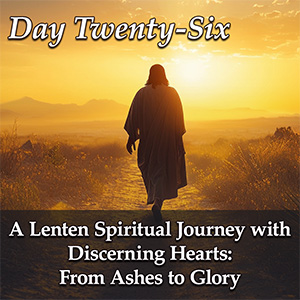Podcast: Play in new window | Download (Duration: 6:31 — 4.6MB) | Embed
Subscribe: Apple Podcasts | Spotify | Amazon Music | Android | Pandora | iHeartRadio | JioSaavn | Podchaser | Gaana | Podcast Index | Email | TuneIn | Deezer | Anghami | RSS | More

A Lenten Spiritual Journey with Discerning Hearts: From Ashes to Glory – Discerning Hearts Podcast
Day 26: From Darkness to Sight: Mercy that Heals
Reader:
Scripture Reading:
John 9:1-7, 13-17, 34-38
As Jesus passed by, he saw a man blind from birth. His disciples asked him, “Rabbi, who sinned, this man or his parents, that he was born blind?” Jesus answered, “Neither he nor his parents sinned; it is so that the works of God might be made visible through him…” He spat on the ground and made clay with the saliva, and smeared the clay on his eyes, and said to him, “Go wash in the Pool of Siloam” (which means Sent). So he went and washed, and came back able to see…
Reflection:
As we enter this Fourth Sunday of Lent, often called Laetare Sunday, the Church invites us to rejoice—not because the journey is easy, but because hope is dawning. Lenten It mirrors our own spiritual journey through Lent: from darkness to light, from blindness to vision, from confusion to deeper faith.
Jesus sees the man born blind and heals him, not because of sin, but so that the works of God might be revealed. This is an invitation for us to reflect on the wounds, limitations, or struggles in our own lives that God desires to touch—not as punishment, but as places where His mercy can be made visible. The man didn’t ask to be healed. Jesus took the initiative. That is mercy.
Notice how the man’s healing is not instantaneous. He must go, wash, and return. His physical eyes are opened, but his interior sight continues to grow as he is questioned and rejected. He moves from calling Jesus a man, then a prophet, and finally, he professes, “Lord, I believe.”
The journey of faith often moves in stages. We may begin in darkness—with limited understanding or perhaps spiritual fatigue—but through prayer, sacrament, and humble trust, our vision clarifies. Jesus comes to us, touches our eyes with His grace, and says, “Go, wash.” That washing happens when we let the truth of His Word confront our blindness, when we turn to the Sacrament of Reconciliation, and when we allow grace to transform our view of ourselves and others.
St. Augustine reflects on this Gospel by comparing the blind man’s healing to baptism:
“He washed his eyes in the pool of Siloam and came back seeing: so too the sinner, when washed in the water of Christ, begins to see the light of faith.” (Tractates on the Gospel of John, 44.10)
And the Desert Father Abba Isaiah reminds us:
“If you want your soul to see clearly, do not look with your eyes at the faults of others, but examine your own heart in the light of the Gospel.” (Apophthegmata Patrum, Isaiah 5)
These two witnesses—one from the heart of the Western tradition, and one from the wisdom of the desert—both point to the same truth: that sight, healing, and faith come from a deep and personal encounter with Christ. Let us remain open to that encounter.
Today, let us ask: Where am I still blind? What areas of my life need to be touched by Christ’s healing mercy? And do I trust that He is leading me from confusion into clarity, from isolation into communion, from fear into faith?
Reflection Questions:
- What areas of spiritual blindness still linger in my heart?
- How have I experienced the mercy of Jesus slowly opening my eyes to truth?
- What are the steps Jesus is inviting me to take today toward greater clarity and trust?
Closing Prayer:
Lord Jesus, You are the Light of the World. Thank You for seeing us even in our blindness, for touching us with Your mercy, and for leading us into deeper faith. Wash our hearts and open our eyes, that we may see clearly the path You are calling us to walk. Help us to trust You even when the way is unclear, and to rejoice in the vision that only Your grace can give.
Amen.
This reflection is written by Kris McGregor of Discerning Hearts®. The Scripture passage is taken from the Jerusalem Bible (1966 edition), used with permission. No unauthorized use or reproduction is permitted without prior written consent.

